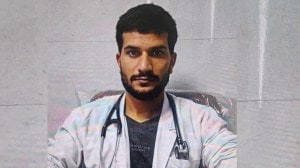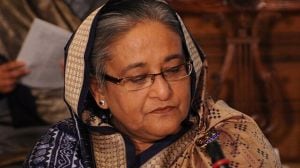There are leads on Hafiz Saeed which amount to evidence. If these are confirmed by Pakistan,it is hard evidence
Home Minister <B>P. Chidambaram</B> was at the Express for an Idea Exchange. In this session moderated by Chief of Bureau <B>Pranab Dhal Samanta</B>,Chidambaram speaks of intelligence sharing after 26/11,reported intrusions on the <B>India-China border and police reforms</B>....
•RITU SARIN: You took over as Home Minister immediately after the 26/11 attack. How comfortable are you in the job now?
The Home Ministry is a very large ministry. It has its fingers in many,many pies. Shortly after the Mumbai attacks,I found that the ministry was not pulling together. What we did was to tell them that the important thing is goal-setting,laying down timelines,working towards achieving those goals. I think we are pulling together now with a greater sense of purpose.
•RITU SARIN: After 26/11,you introduced the 12 oclock meeting with the IB chief,RAW chief and NSA. Is that a permanent feature?
For the time being,the meeting is a regular feature. I take the meeting every day when I am in Delhi. In my absence,the NSA takes the meeting. This has virtually put an end to finger pointing. Nobody can now say they did not know of something. The question is,how long will the minister continue to take the meeting? At least another year or so till being part of the team percolates down to every organisation. I will be very happy if one of the Ministers of State is designated to chair this meeting.
•RITU SARIN: Is there greater percolation of intelligence now?
At this level,we are ensuring that everything is shared. Nobody is kept out of the loop and nobody can remain out of the loop. I can ask anybody at the meeting why something happened. Secondly,it is real time intelligence sharing. Thirdly,it helps in taking quick decisions.
•AMITABH SINHA: What were the specific results achieved during your recent US visit?
Much has been made of the Hafiz Saeed chapter but it was only one small part of the agenda. The main purpose of the visit was to work out an arrangement by which we can share intelligence on a real time basis and then to share analysis of intelligence. We also discussed access to technology. We need technology,we need to improve the skill sets of our people. Then there was the very important need to get to know the important people in the US on a personal basis. I believe the objectives were substantially achieved.
•DHIRAJ NAYYAR: In your experience,how different is reforming the security apparatus from reforming the economy?
The process of any reforms is more or less the same. But the actions that you take are very different. On the economic front,we take actions on income tax,change tax rates,exchange rates,etc. These are influenced or impacted by what happens in the rest of the world,factors beyond your control. On the internal security front,what impacts your decisions are mainly internal: how do state police forces or your own para-military forces respond to a situation. Thus,your reforms on internal security or security as a whole is impacted by internal dynamics.
•MANU PUBBY: Does the government see a bigger hand behind the recent reported intrusions on the India-China border?
On the question of intrusions,the media came out very poorly. I dont know if there was an agenda. For example,there was no incident where ITBP soldiers were injured. We issued a comprehensive,flat,stout denial,which was carried grudgingly as a clarification rather than as an apology. The ITBP has lodged a complaint with the Delhi Police. I believe it will stop at that.
•DHIRAJ NAYYAR: What are the lessons for India from the global financial crisis?
The lessons are regulation should remain one step ahead of innovation. Our regulation has been 2-3 steps ahead of innovation. And therefore,we did not suffer the kind of meltdown others did. Not one bank in India collapsed. The other lesson which has not yet been learnt is that as we return to normalcy,we would need to revisit our regulations. We cannot persist with our ostrich-like mindset that over-regulation is the answer to financial instability. Over-regulation may result in crippling the energies that drive economic growth in this country.
•NEERAJ CHAUHAN: How safe is Delhi in the hands of the Delhi Police,especially ahead of the Commonwealth Games?
In a mega city with a population of 1.2 crore,a certain number of crimes will happen. Broadly,crime can be classified into two kinds: organised and impulsive. The police can only police organised crime. The test for Delhi Police is to how to prevent organised crime and how well they investigate impulsive crimes. On both counts,Delhi Police comes out pretty high compared to any other city in the country.
•DHIRAJ NAYYAR: What is the governments position on allowing Chinese workers in India?
We are no longer giving visas to unskilled and semi-skilled Chinese workers because those unskilled and semi-skilled workers can be found in India. Those who have already come in will complete their projects and go back.
•PRANAB DHAL SAMANTA: Are you saying that issuing so many business visas was a
mistake?
I wont call it a mistake. I think there was a sense that maybe these projects require so many foreign workers. But one understood that the skill they were bringing was virtually replicable in India. It was then understood that it did not make sense to give visas to semi-skilled and unskilled people.
•PRANAB DHAL SAMANTA: Unlike other foreign companies,Chinese companies face more scrutiny. Isnt it more difficult if you are a Chinese company setting up shop in India?
Not as a matter of rule,no. I think we should look at the Chinese coming in like workers of any other country but we should also look at ownership,we should also look at the sector concerned. After looking at all these factors,if there is a genuine security concern,then the overriding clause of security should prevail. But this should not apply to every Chinese investment.
•J P YADAV: Will there be Central intervention in West Bengal given the level of Naxal violence?
There is no case for Central intervention in Lalgarh. That is the states problem. The state asked us for forces,we have given them forces. The forces are under the command of the state police and it is for them to tackle the problem. It is for the people to judge whether they have succeeded or failed. On balance,it does appear that they have not met with the kind of success we had hoped for.
•RITU SARIN: Is there a qualitative difference in the nature of evidence we have against Hafiz Saeed and the evidence we have handed over to Pakistan on other 26/11 accused?
Yes,because Hafiz Saeed did not come to India. All his overt actions were done on Pakistan soil. So all I can give are leads as to what he did. The evidence is on Pakistan soil. If the Pakistan government throws up its hands and says it cannot or it is unwilling to investigate on Pakistan soil,that is a very sad commentary on the Pakistan police.
•AMITABH SINHA: You mean there is no evidence against him as of now and Pakistan will have to investigate further?
There are leads which amount to evidence. For example,when Kasab said Hafiz Saeed asked a man to set up 10 targets and asked each one of them to hit the targets and he was given target No 4 and he hit target No 4 and Hafiz Saeed personally complimented him on his accurate firing,that is a lead bordering on evidence which has to be substantiated by locating the place where the target practice took place,by talking to the people involved,by investigation. If these are confirmed,it is hard evidence.
•PRANAB DHAL SAMANTA: Is there any possibility of a joint investigation with Pakistan?
No more investigation needs to be done on Indian soil. We have filed the chargesheet,the trial is well on its way and is about to be concluded. All the investigation that has to be done now is on Pakistan soil. FBI asked for access,they (Pakistan) denied it. If they did not give access to FBI which is obliged to investigate the attacks since six American nationals were killed in 26/11,what chance do we have?
•AMITABH SINHA: So what is the way out?
I see the tunnel. I dont see the end of the tunnel yet. We have a Letter Rogatory for Hafiz Saeed. We will follow the processes of law which are available to us. At some point of time,the Pakistan Government,I hope,will fall in line and investigate and help us gain access to the evidence of that investigation.
•RITU SARIN: At some stage,India will have to take a call on the nine bodies of the 26/11 perpetrators lying in cold storage in Mumbai.
What do we do? No Muslim organisation is willing to take those bodies and bury them. Pakistan has grudgingly accepted that some of them maybe Pakistani nationals. There must be some organisation which is willing to come forward to bury them and we are willing to work with them. They are dead and deserve a decent burial.
•AMITABH SINHA: Is there any rethink on the affidavit filed by the Centre on the Ishrat Jehan encounter case,considering the state government has tried to use that to justify the encounter?
I can only describe that as a malicious attempt (by the state government). An affidavit was prepared 2-3 years agoit was brushed up and filed. I wish I had read it before it was filed. I was not in Delhi; it was the last day for filing. Had I read it,I would have made sure there was no room for the state government to use it to justify the killings. Yes,some sentences in the affidavit could have been differently worded. But the thrust of the affidavit is,this is the intelligence we have and this is what we have shared with the Gujarat government.
•SHEKHAR GUPTA: Do you think such public arguments between the Centre and state governments should be avoided?
This was a case where the finger of accusation was pointed towards the state government. Therefore,the state government was naturally keen to defend itself. The Central government should have been more careful and,without in any manner interfering with the judicial process,it should have filed an affidavit and taken the state government into confidence that were filing this affidavit on sharing intelligence. This should have been drafted,shared with the state government and then filed. In which event,the state government cant use the affidavit as a shield.
•RAVISH TIWARI: After having decided not to oppose the Delhi High Court ruling on Section 377,is the government considering anything further like legalising gay marriages?
Section 377 is intact. Not a word has been struck down. One kind of behaviour has been carved out of 377 to say that this behaviour cannot be made criminal. If you make it criminal,it violates Articles 21,14 and 15 of the Constitution. That is all that the judgment says. The government has decided not to file an appeal against the judgment. We think there is no legal error in the judgment. That is where it stops. I dont see that the argument can be taken any further and certainly,we dont support anything like gay marriages.
•MANOJ C.G.: Your cabinet colleague,Mamata Banerjee,has been very vocal against the West Bengal government. How much pressure are you facing from her to act against the government?
She is an opposition party leader in West Bengal. She is entitled to be vocal against the ruling party and I think there is considerable justification for her to be vocal. In inter-party clashes,her party is the suffering party. The chief minister has a duty to ensure that inter-party clashes do not happen.
•SAUBHIK CHAKRABARTI: In Bengal,cadres of the ruling CPM are taking on Naxalites. You dont see Congress or BJP cadres taking on Naxalites in states ruled by them. Doesnt Bengal pose a special problem for you as home minister?
For many years CPI(Marxist) and CPI(Maoists) have regarded themselves on the same side of the line. So wittingly or unwittingly,there has been some degree of collaboration between the CPI(Marxist) and CPI(Maoists) for many years. Today,they are ranged against each other. It is an untenable situation. That is the price,I think,the CPI(M) is paying for neglecting law and order.
•MANU PUBBY: There has not been any major terrorist strike since the Mumbai attack. What has changed on the ground?
I dont think there is any let-up in the plans of militant organisations in Pakistan,especially LeT and JeM. I think they continue to plan and plot. What has changed is that our intelligence sharing is now on a real-time basis and the level of alertness,vigilance of states is much better. We are proactively seeking out cells and modules to neutralise them. Let me say very candidly that while effort plays a big part,luck also pays a big part. We have to be ever vigilant and we have to raise our level of preparedness.
•AMITABH SINHA: When are you submitting the Liberhan report to Parliament?
I have read the report. I have not made a judgment. It will be tabled as required under law,within six months after submission. It will be tabled with an action taken report.
•RITU SARIN: What about the large number of pending death penalty cases? The Supreme Court has recently nudged the Government on the issue.
Of the 28 cases with us,only two are with the Home Ministry or with the government. The rest have been submitted to the Presidents office. Supreme Court is right in saying that under law,the President means the central government. Thats the scheme of our Constitution. Therefore,they have said that the central government must take a decision. I dont see that as a slap on the wrist or reprimandtheyve said please take a decision as early as possible. I think the judicial process ends when the Supreme Court decides the matter. The mercy process starts after that. I think enough time has to be allowed to let the mercy petitions be taken to their logical conclusion.
•SAUBHIK CHAKRABARTI: Very senior lawyers have complained against a High Court judge. Shouldnt the government take a firm stand?
I wont comment on Justice Dinakarans case. This is the only country where judges appoint judges. In every other country,it is the executive that appoints judges. In our country,we must evolve our own sui generis system. In my view,the system that is most suited to India is for the executive and the judiciary to jointly have a mechanism by which persons will be selected. That is why the government is keen on a judicial commission.
•SAUBHIK CHAKRABARTI: Fali Nariman has suggested having an independent ombudsman. Your comments.
I have read Fali Narimans critique. He candidly admits that there is no such ombudsman anywhere in the world. You cannot have an ombudsman over judges. All that youre creating is one more layer. I dont think that works. We are talking about appointment of judges,enforcing norms for judges,removal of judges. This can be done by an empowered judicial commission,chaired by the Chief Justice of India comprising sitting judges,jurists and members of the executive.
•VAIBHAV VATS: Is there any thought being given to repealing the Armed Forces Special Powers Act (AFSPA)?
We are proposing amendments to the AFSPA. As far as the presence of security forces in Jammu and Kashmir is concerned,I have said on the border,the army will be present. The paramilitary will be deployed in the hinterland to aid and assist the state police. And the state police will take the frontline in maintaining law and order.
•GEETA GUPTA: Can you describe the progress made by the National Investigating Agency?
At the moment,it is investigating three cases. It has enough officers. I have approved the creation of an intelligence wing in the NIA. It will begin to develop its own intelligence regarding terrorist cases.
Transcribed by Geeta Gupta and Vaibhav Vats



- 01
- 02
- 03
- 04
- 05




























